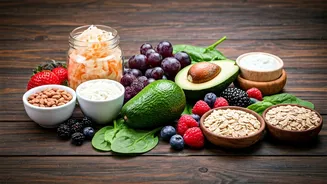Embrace Gut Wellness
The health of your gut microbiome plays a crucial role in overall well-being, influencing everything from digestion and immunity to mental health. The gut microbiome is
a complex ecosystem of microorganisms that influences how the body processes nutrients, and fights off illnesses. A healthy and diverse microbiome supports optimal digestive function, nutrient absorption, and immune function, but it also impacts mental clarity. Incorporating specific foods into your diet can significantly improve gut health and its many benefits. Prioritizing gut health through diet is a powerful step towards building a foundation for a healthier and more resilient body. This article explores a selection of foods to support a thriving gut microbiome, as suggested by a Harvard-trained gastroenterologist.
Fermented Foods Power
Fermented foods are a cornerstone of a gut-friendly diet, acting as potent probiotics. Think of yogurt, kefir, sauerkraut, kimchi, and kombucha. These foods undergo a fermentation process, which fosters the growth of beneficial bacteria, that then bolster the gut's microbiome. Probiotics help improve digestion by reducing inflammation and supporting the gut lining. Yogurt and kefir, for instance, offer a rich source of probiotics, such as Lactobacillus and Bifidobacterium, known to support gut health. Sauerkraut and kimchi provide a wealth of beneficial bacteria and are loaded with fiber, contributing to digestive wellness. Regularly including a variety of fermented foods can enhance gut diversity, increase nutrient absorption, and improve overall digestive performance. Try adding a daily serving of these to your diet for best results.
Fiber-Rich Plant Foods
Fiber, particularly the soluble type, is a food source for the beneficial bacteria residing in your gut. Think of oats, apples, bananas, and sweet potatoes. These fibers act as prebiotics, nourishing and promoting the growth of probiotics. Oats contain beta-glucan, a soluble fiber that fuels the production of beneficial gut bacteria. Apples and bananas provide various fibers, promoting diverse gut bacteria, and fostering a healthy digestive environment. Sweet potatoes, besides being rich in fiber, offer antioxidants that support gut health. Including a wide range of fiber-rich plant foods can contribute to a more diverse and thriving gut microbiome. This diversity supports optimal digestive functions, helping to manage inflammation, and improving overall gut health and well-being.
Garlic, Onions, Leeks Thrive
Garlic, onions, and leeks are powerful prebiotics, fueling the beneficial bacteria in your gut. These vegetables contain inulin, a type of fiber that promotes the growth of probiotics. Garlic contains allicin, a compound with antibacterial properties that aids in maintaining gut balance. Onions are loaded with fructans, another type of fiber that acts as a prebiotic, enhancing beneficial bacteria growth. Leeks also offer fructans, supporting the development of a diverse and healthy gut microbiome. Incorporating garlic, onions, and leeks into your meals not only adds flavor but also supports the growth of beneficial bacteria, which contributes to better digestion, nutrient absorption, and overall gut health.
Beans and Legumes
Beans and legumes are nutritional powerhouses for gut health, offering both fiber and protein. They're excellent sources of resistant starch, a type of fiber that resists digestion and provides a food source for gut bacteria. Black beans, lentils, and chickpeas are loaded with fiber and prebiotics. These plant-based foods promote the growth of beneficial bacteria. Lentils offer a mix of fiber and protein, fostering a healthy gut environment and improving digestive functions. Chickpeas, used in hummus, provide fiber and prebiotics, supporting gut diversity and health. Regular consumption of beans and legumes can boost gut diversity, support better nutrient absorption, and help maintain overall digestive health.
Whole Grains Benefits
Whole grains are full of fiber, which helps promote a thriving gut. Think of oats, brown rice, and quinoa. They're packed with essential nutrients, supporting a diverse gut microbiome. Oats are a great source of soluble fiber, like beta-glucan, that feeds beneficial bacteria. Brown rice provides fiber and essential nutrients, improving gut health. Quinoa, while a seed, offers fiber and protein, contributing to a healthy digestive system. Including whole grains in your diet can increase gut diversity, boost digestion, and enhance overall gut health. Remember, eating the right grains in moderation is key.
Nuts and Seeds
Nuts and seeds offer a mix of fiber, healthy fats, and nutrients that support gut health. Almonds, chia seeds, and flaxseeds are great additions. They add fiber, boosting the growth of beneficial gut bacteria. Almonds offer fiber, which contributes to a healthy digestive environment. Chia seeds are a good source of fiber, and flaxseeds are packed with fiber and omega-3 fatty acids, which can help lower gut inflammation. Eating a variety of nuts and seeds can increase the diversity of your gut microbiome, support digestion, and boost overall gut health. It's an easy way to get healthy fats and nutrients into your diet.
Berries and Fruits
Berries and fruits are loaded with fiber and antioxidants, beneficial for gut health. Blueberries, raspberries, and apples are rich in antioxidants and support a healthy gut. Berries provide soluble fiber and antioxidants, which feed beneficial bacteria. Apples contain pectin, a soluble fiber that promotes the growth of good bacteria. Consuming these fruits can enhance gut health, help with inflammation, and improve digestion. The antioxidants in these fruits can also offer added health benefits.
Olive Oil and Fats
Healthy fats like olive oil support gut health by reducing inflammation and supporting good bacteria. Olive oil has anti-inflammatory properties that can soothe the gut lining. It is essential to include healthy fats in your diet for overall wellness. Olive oil is a great choice. Including healthy fats supports the growth of beneficial bacteria, which enhances digestion and improves overall gut function.
Herbs and Spices
Herbs and spices are packed with antioxidants and compounds that support gut health. Turmeric, ginger, and cinnamon are excellent choices, offering anti-inflammatory properties and aiding digestion. Turmeric contains curcumin, which can reduce inflammation in the gut and boost the growth of beneficial bacteria. Ginger can aid digestion and reduce nausea. Cinnamon has anti-inflammatory properties that can soothe the gut. Regularly using these herbs and spices can support gut health by promoting a diverse and healthy microbiome, improving digestion, and fighting inflammation. It's a simple way to add flavor and benefits to your meals.



















